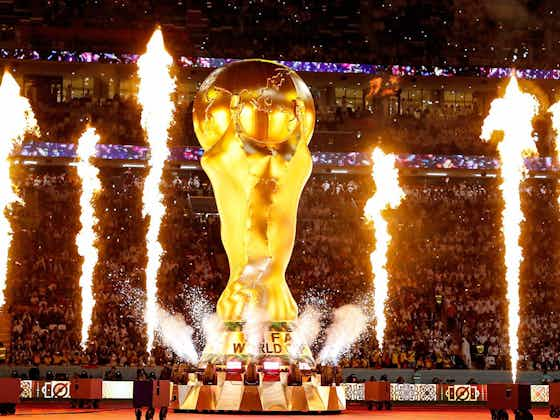The Independent
·20 November 2022
Qatar World Cup opening ceremony showed the BBC can do both sport and politics

In partnership with
Yahoo sportsThe Independent
·20 November 2022

pening ceremonies to major sporting events are, in the robust opinion of a committed sports fan, a sop to the people who love the drama and spectacle of international commingling, but have little interest in the games being played.
At the Olympics, they have become an enormous, gaudy art form in their own right – from the jaw-dropping show at Beijing’s Bird’s Nest to the cringe-inducing fantasia of London 2012 – but they’ve never been such a big part of World Cups. Perhaps the only lasting memory of an opening ceremony is Diana Ross missing, with the goal at her mercy, during the 1994 curtain-raising bonanza. On Saturday, Gianni Infantino, the polyglot head of FIFA, set the tone for this tournament’s opening.
Sat at a press conference, an array of sponsored items laid out before him like The Generation Game conveyor belt, Infantino gave an impassioned defence of the tournament. “Today, I feel Qatari,” he announced to the assembled delegates of the world’s media. “Today, I feel Arab. Today, I feel African. Today, I feel gay. Today, I feel disabled. Today, I feel a migrant worker.” His words went down like a snog in Doha; you know you’ve struck a bum note when even Alan Shearer calls it “rubbish”.
In years to come, I suspect that Infantino’s craven words will be seen as the tournament’s real opening ceremony. But, without the benefit of that historical perspective, Sunday saw the tournament proper get underway, with a dazzling advert for the Qatari state. The show opened with a Morgan Freeman narrated – and oddly shark infested – introduction to the desert land.
“I embarked on a journey through a land of both earth and sea,” Freeman told the audience. “From this land we heard a call to the world to connect, to return, if only for a moment, to that which can bring us together…” As Freeman emerged in the Al Bayt stadium, he was greeted by a roar from the packed crowd. Of course, all of this was being aired on the Red Button and online, but none of it would’ve been heard by BBC One viewers, who were being treated to an entirely different show.
A show where – in place of waving scimitars, sexy dancers wearing spacey ski goggles, and the tournament mascot, an anthropomorphised keffiyeh, floating like an enormous stingray – Ros Atkins, the newsreader, introduced the core controversies of the Qatari hosts.
The BBC’s studio team of Gary Lineker, Alan Shearer, Alex Scott and Ashley Williams remained steadfastly focused on the issue of football (with a smattering of politics) while the stadium behind them was aglow, bathed in the light of sports washing. And so viewers on BBC One did not bear witness to the performance of Jung Kook, the K-Pop superstar, warbling the official 2022 World Cup song, “Dreamers”.
“We are the dreamers,” he sang. “We make it happen, because we believe it.” He pranced about in a display of the sexless androgyny that has made K-Pop one of the world’s biggest cultural exports, fist bumping with the 41-year-old Qatari singer, Fahad Al Kubaisi, who joined him on the track. This union of the great nations of South Korea and Qatar might not win any musical prizes, but as Freeman told the assembled masses: “What brings together nations also brings together communities.”
Whatever that means. Over on BBC One, meanwhile, Jeremy Bowen, the BBC’s legendary Middle East correspondent, was brought in to provide some geopolitical analysis. It neatly offset Shearer’s inane observation that “every country has its issues, including our own”.
This was hardly like counter-programming an England game with a lecture from Greta Thunberg, but it was a chastening reminder of the stakes, and perhaps a fairer introduction to the issues than the soft power showboating available on the Red Button. Though it begs the question: why didn’t this happen in 2018 at the World Cup in Russia? The exercise in cognitive dissonance was aided by the fact that, let’s face it, Qatar versus Ecuador is about as unglamorous as an opening tie gets (though Russia v Saudi Arabia, in 2018, would give them a run for their rubles).
Proceedings were punctuated by strange cutaways to the Ecuador fans, chanting and shouting away, but bemused about their place in this small fragment of history. It was just one of many surreal threads on display: the decision to relegate the opening ceremony to the Red Button meant that it was presented without explanatory commentary or subtitles (including a speech in Arabic). Only when Freeman came into frame (after Evan Almighty it became quite apparent he’ll do anything for the pay cheque), to wheel out vapidly inspirational aphorisms, did I have a sense of what was going on.
These two opening ceremonies – the one broadcast to the world, and the one broadcast by the BBC – illustrate both the challenges and opportunities of this World Cup. This is not a sporting carnival, like the one we witnessed at the Maracanã in 2014, but something divisive. Perhaps it was fitting, then, to see it cut in two: the duty to moral rigour upheld on BBC One, with obligations as an international broadcast partner pushed to the digital margins. The real question now is whether this tone will continue to be struck throughout the tournament.
Will they get Frank Gardner on co-comms? Lyse Doucet in press conferences? John Simpson giving touchline analysis? Or will they consider the job done? After all, they should have a simpler task with the next match: England versus, er, Iran.
A picture caption in this article was amended on November 21 2022. It inaccurately referred to Martin Freeman, but should have referred Morgan Freeman – as the article does.






























































